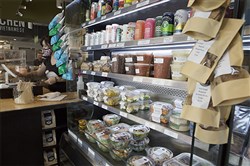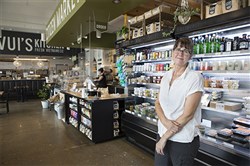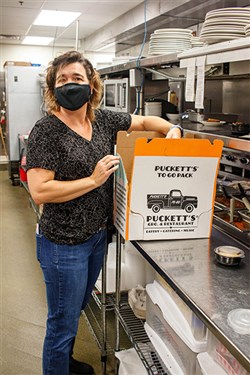VOL. 44 | NO. 38 | Friday, September 18, 2020
Takeout’s fallout
By Catherine Mayhew
Monday it was Chinese. Wednesday was pizza night, and Saturday you splurged and got a complete high-end dinner with a steak (medium-rare, thank you) and Caesar salad. All of it take out. All in single-use containers.
Whether you want to support local restaurants or you just hate cooking, takeout and delivery in the era of COVID-19 is, well, epidemic. A survey by OpenTable of diners who use the service found that takeout one or more times a week was up 72% compared to pre-COVID times.
Some restaurants – pizza places and fast-food chains, for example – were already geared toward to-go orders. Many local and fine-dining restaurants quickly retooled their business models to focus on takeout.
And in a world full of uncertainty, food was safe. Centers for Disease Control guidelines concluded “currently, there is no evidence to suggest that handling food or consuming food is associated with COVID-19.”
But all those containers. Where did they go? Well, if you threw yours in the trash you darn well know where they went – to a landfill.
Eating and cleaning
There are no figures for exactly how much takeout containers contributed to increased solid waste. After all, nobody’s looking in your trash bags to see what’s in there. But the Solid Waste Association of North America reports a 20% average increase in municipal solid waste and recycling from March into April this year.
Several factors go into that increase. People cooking at home more and adding takeout to that equation contributes some. But in the beginning of the pandemic, folks also decided it was time to clean out the attic and tackle some home improvement projects they’d been putting off.
“When this first happened in March, the solid waste industry had no idea we were going to be slammed,” says Nancy Zion, director of Williamson County Solid Waste. “It was because everybody was cleaning. So that was very alarming to us. And just the onslaught of waste coming through our convenience centers.
“But now that we look back, it makes sense. They were at home cleaning. They were at home cooking.”
Solid waste departments in Davidson, Williamson and Rutherford counties report a 300% increase in the amount of waste that normally flows to their landfills and convenience centers.
“We experienced literally triple the amount of volume coming in,” says Matt Nolen, Rutherford County’s solid waste director. “People were told to stay home, and they were cooking at home and creating construction debris.”

Ready-to-heat meals, like these at the Market at Hunter’s Station in East Nashville, are convenient for those trying to juggle jobs and kids at home. But the packaging is causing unexpected problems.
-- Photo By Michelle Morrow |The LedgerNolen says every county in Tennessee handles waste in different ways. And when the volume of trash threatened to overwhelm the system, they found different solutions.
The city of Franklin suspended its Blue Bin recycling program in March because its processor could not take the material. So, Williamson County, which operates separately, saw a huge increase in use of their convenience centers as Franklin residents opted to take advantage of them instead. Rutherford County had a different problem.
“When we saw the jump, I got with the mayor and told him if we allow this to continue our centers will be full,” Nolen says. “We’re going to have to stop taking something. Construction and demolition is what we cut out. If you’re going to cook at home or bring food home, you’re going to have to do something with the trash and if it sits it attracts critters. Construction debris doesn’t.”
All three counties are managing to keep up with the waste for now, but Rutherford has an urgent need to find a better solution. Its Middle Point landfill, which takes Rutherford County solid waste and some of Davidson County’s trash, will be at capacity in about seven years. Officials there are looking at more environmentally friendly options but haven’t settled on anything yet.
“What I would ask is for a one-week period just keep mental track of everything you threw away,” Nolen suggests. “The words we use here are culture change. We’re going to have to change the culture of our citizens and that’s not an easy thing to do.”
Friendlier packaging
So, let’s talk about polystyrene. Chances are you’ve seen a lot of it in the last seven months in the form of Styrofoam to-go containers. Bloomberg News reports several companies that manufacture polystyrene products have seen big sales increases since March.
The reason? It’s cheap to produce and cheap to purchase. If you’re a mom-and-pop restaurant trying to stay afloat doing takeout, polystyrene will probably be your choice every time for containers.
But you can’t recycle the Styrofoam containers used to transport most food. About 98% of Styrofoam is actually air, and its porous, allowing food to seep into the material. So, landfill, here it comes.
But when restaurants had to pivot to increased takeout, some of them decided to use the opportunity to make their packaging more environmentally friendly.

Laura Wilson, founder of Citizen Kitchens at her location in Hunters Station.
-- Photo By Michelle Morrow |The LedgerThe management team at A. Marshall Hospitality has always monitored hotel occupancy as a way to predict sales. As operators of Puckett’s, Scout’s Pub, Deacon’s New South, Americana Taphouse and Hattie Jane’s Creamery, they had a lot of territory to cover.
“When it first hit us, about March 10 or 11, I started noticing that there were travel declines,” says Lyle Richardson, chief operating officer of A. Marshall. “I keep an eye on occupancy. We started to notice that our sales declined a little bit so we paid more attention to the news. And it felt like it just hit us. OK, we’re seeing a bit of a decline to we’re shutting down restaurants and laying off people. It hit us hard and it hit us fast.”
The restaurant group had been working on a packaging concept called Puckett’s To Go before the pandemic hit, but accelerated the process when takeout became vital. The to-go packs include 2 pounds of meat, two-quart sides and bread for 4-6 people at $49 each with containers fitting snugly inside a cardboard box with handles.
“We needed to focus on something that was durable,” Richardson acknowledges. “The packaging inside all fit perfectly so it didn’t rattle around and spill.”
They went with a product made of mineral filled polypropylene that is sturdy, can retain temperatures and is recyclable. Unlike Styrofoam, it’s not porous and when rinsed after use looks brand-new.
“We went to a more environmentally friendly product,” Richardson continues. “We are using a lot more so we wanted to make sure we were being responsible.’’
By the beginning of April, the to-go program was running full force with about 80 to 100 boxes going out a day. Puckett’s went from 2% or 3% takeout to about 16%, and Scout’s Pub, located in the Westhaven community, started doing a whopping 27% takeout. Golf cart delivery didn’t hurt.
Over in East Nashville, Laura Wilson went a different way.
The founder and partner at Citizen Kitchens and Market at Hunters Station, which opened in October, knew from the beginning of the project that sustainable packaging would be part of the concept.
“Paying attention to food, farming and the environment has always been part of my personal ethos,” she says. “I was very excited when starting the food hall and part of the brand was using sustainable packaging. We decided as an entire facility that all of the to-go ware is compostable.

A worker at Puckett’s Grocery and Restaurant prepares a Puckett’s To Go box, a concept the restaurant group had been working on prior to the pandemic.
-- Photo Provided“I believe in recycling. It’s better than going to a landfill. But there’s many ways it’s problematic. Not all recycling is being turned into reusable product.”
The market and kitchens, which host food entrepreneurs producing everything from pies to vegan entrees, use the product as well as all the restaurant tenants such as Vui’s Kitchen and The Grilled Cheeserie.
All of the compostable containers and utensils are collected in special bins in the market and deposited in a special container in the parking lot. Compost Nashville then picks the load up and transports it to a facility in Ashland City that turns the waste into compost. Like Richardson, Wilson sees the cost of the containers to be a wash to other takeout options.
Wilson is cautious about ramping up the in-store dining in Hunter’s Station but is seeing more of those compostable products go out the door as patrons pick up takeout. Several Metro convenience centers offer bins to drop off compostable material. Customers can also return the containers to Hunters Station.
“We’ve been able to pivot,” Wilson says. “We’re seeing more people in Hunters Station and buying from Citizen Market. I don’t want to walk into a full restaurant right now. I would love to be making the money, but the cost of that (in health terms) is too high. We’re probably at half capacity and half sales. We’re just tightening our belts as tight as they will go.”
Composting nerds
So that leads us to the future. Who is providing all the containers to Hunters Station and hauling away the trash for composting? Two recent graduates in environmental engineering from Middle Tennessee State University. You might call them composting nerds. They wouldn’t disagree.
Mostafa Hassan, 26, and Spencer Sherrill, 27, distribute compostable packaging not only to Hunters Station but also to the Country Music Hall of Fame, Belle Meade Country Club and other businesses.
“We met in college, and it’s something that we were both passionate about,” Hassan says. “He (Sherrill) had the waste thing figured out. Packaging was a missing link. We were still sending so much to the landfill that wasn’t compostable.”
What makes the packaging compostable is a thing called polylactic acid that is derived from renewable resources like cornstarch or sugar cane and makes the containers biodegradable. Hassan and Sherrill source their products from different manufacturers to offer a number of specific sizes and shapes. The beauty of companies such as Hunters Station that use the containers exclusively is that there’s no waste from mingling with other products.
“It’s the sorting issue,” Hassan adds. “Imagine you’re in a restaurant and you’re trying to be compostable and your using recyclables. You have to separate it and sort it. With compostable you throw everything into one bin. You don’t have to worry about contamination.”
Sherrill is also a partner in Compost Nashville, which picks up residential and business compostable waste and transports it to a facility in Ashland City for processing.
“It’s a solution for homeowners or apartment dwellers that can’t compost on their own,” he adds. “All we are is a middleman between the customer and the compost facility in Ashland City. Customers get bins every week.” Once the material is composted, it’s delivered back to customers to use in their yards.
Compost numbers from residential customers have gone up from 25,905 pounds in August 2019 to 49,265 pounds this past August.
“We had no idea it would be so popular,” says Sherrill of both Compost Nashville and the container business. “We hope to expand this into waste energy at some point. We know that’s a huge chunk to chew off but that’s our dream to get into renewable energy production from waste streams.”
Mostafa Hassan and Spencer Sherrill, let us introduce you to Matt Nixon in Rutherford County, who is desperately seeking a better solution to landfills. You might have something to discuss.